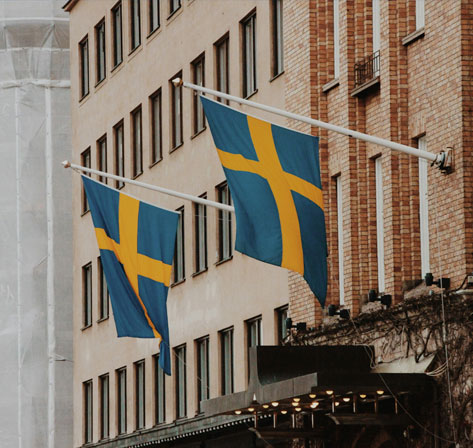January 2023
Sweden’s Third EU Presidency – An Interview with Björn Arvidsson, Head of Trade and Economic Affairs at the Swedish Embassy in Washington, D.C.
Region: Europe
Author: Blue Star Strategies U.S. Team
There is a strong unity within the EU on the challenges we are currently dealing with, and Sweden will continue to work towards a safer and greener Europe, in close cooperation with partners.
On January 1st, Sweden assumed the presidency of the EU Council. Sweden is the third and final country to assume the presidency under the current trio program of the EU presidency following France and the Czech Republic. Sweden’s presidency comes amidst the backdrop of the ongoing war in Ukraine, the energy crisis in Europe, the ongoing climate crisis, and a cost-of-living crisis. With the war in Ukraine nearing its first anniversary, and Ukrainian armed forces in a strong position Sweden must continue the task to generate the support of European nations to strengthen peace in Europe in the future. This will require aligning EU members on a long-term strategy which includes future EU sanctions policy towards Russia, reaching a settlement to the conflict in Ukraine, planning for the reconstruction of Ukraine, and the further integration of nations in the west, including its accession to NATO.
Against this backdrop, we interviewed Björn to hear the Swedish government’s perspectives on some of the topics related to Sweden’s presidency.
What will Sweden’s priorities be under its presidency of the EU council?
Sweden is assuming the Presidency at a time when the EU is facing unprecedented challenges for Member States and the Union as a whole. Russia’s full-scale invasion of Ukraine means that issues relating to security and defence, will be high on the EU agenda during the Swedish Presidency. Continued economic and military support for Ukraine, as well as support for Ukraine’s European integration, are key priorities.
A greener, more secure and freer Europe is the foundation of Sweden’s priorities.
This is Sweden’s third EU Presidency. What are the key lessons learned from Sweden’s first two presidencies?
The number of EU member states has almost doubled since the first presidency in 2001, when there were only 15 member states compared to 27 today. Lessons have of course been learned, but the geo-political context and economic outlook change over time.
Whatever the current challenges are, the role of the presidency is to be an honest broker and effective crisis manager. This is a task that Sweden takes seriously and is the mission of our Brussels based team.
In what ways will Sweden’s priorities represent continuity with the objectives set forth by France and the Czech Republic under the trio program of the EU presidency?
There is a strong unity within the EU on the challenges we are currently dealing with, and Sweden will continue to work towards a safer and greener Europe, in close cooperation with partners.
To what extent have Swedish authorities consulted with their French and Czech counterparts in preparing for the EU presidency?
In preparing for the EU presidency, Sweden has had close dialogues with the French and Czech counterparts but also with the European Commission and other member states.
How does Sweden aim to address challenges related to EU solidarity in coordinating EU sanctions against Russia over its role in the war in Ukraine?
Sweden will push for the EU to continue to stand up for international law and a rules-based world order. In response to Russian aggression, the EU has adopted the most powerful sanctions ever. The extensive work on implementing and developing the sanctions will also continue during the Swedish presidency.
Is Sweden considering how to coordinate reconstruction efforts in Ukraine if the war in Ukraine were to end under Sweden’s presidency of the EU?
Sweden shall do our part in providing maximum possible support to Ukraine, including in the reconstruction work. The establishment of international cooperation for the coordination of reconstruction aid is a priority task in which the EU has an important role to play. We have to deal both with the urgent needs Ukraine faces now, and plan for the long-term efforts once the conflict is over.
What dynamic do you think Sweden and Finland’s bids to join NATO will factor into Sweden’s presidency?
While Sweden’s bid to join NATO is not directly linked to the EU presidency, they both take place against the backdrop of unique security challenges in Europe and reflect the need for common approaches to the threats coming from Russia.
At a high level, what role do you think the U.S. private and public sectors can play in supporting Sweden to ensure the success of its EU presidency?
We welcome all input we can get from U.S. public and private sectors. The transatlantic relationship is central and will continue to be put high on the agenda as we hold the EU presidency.
